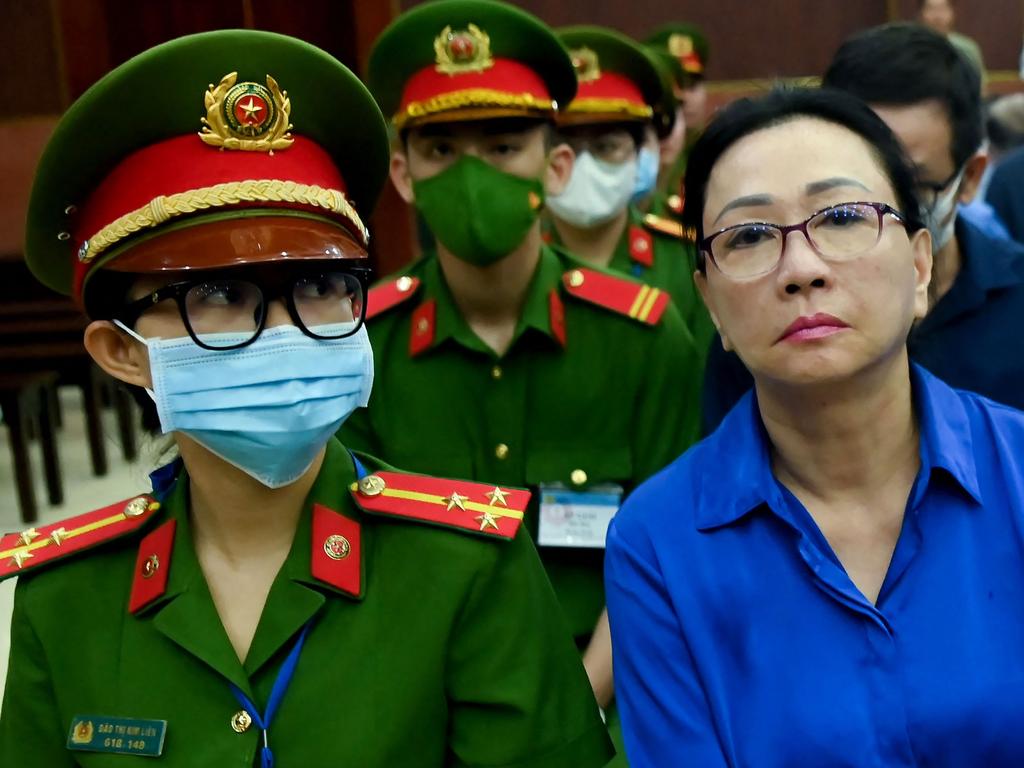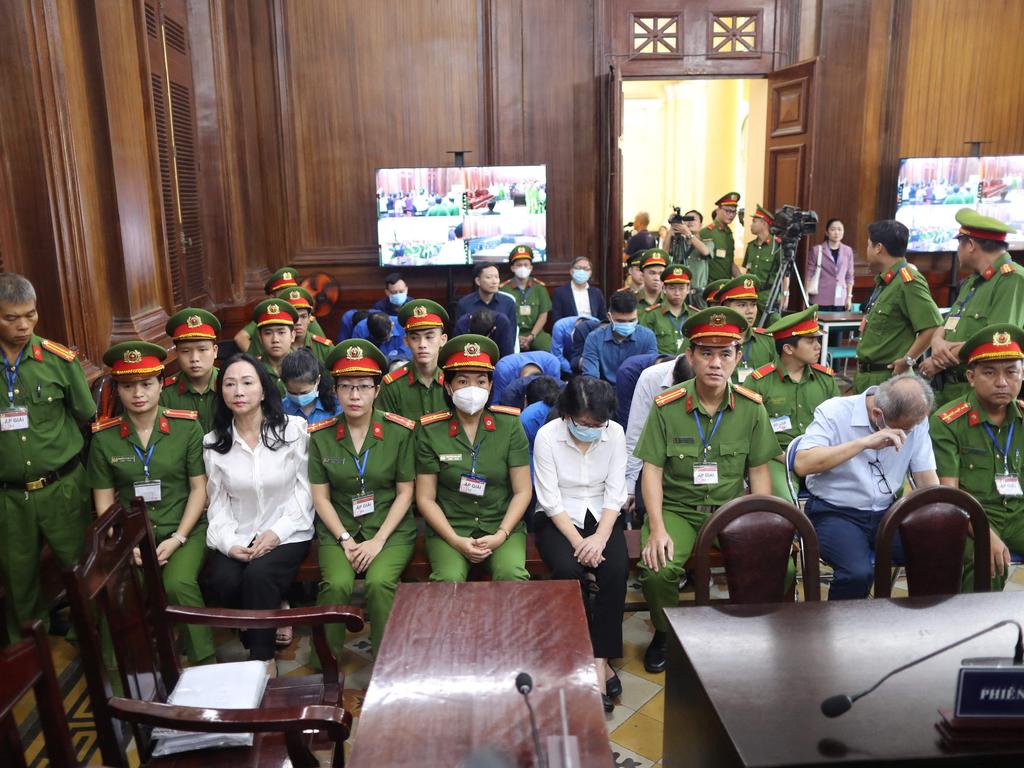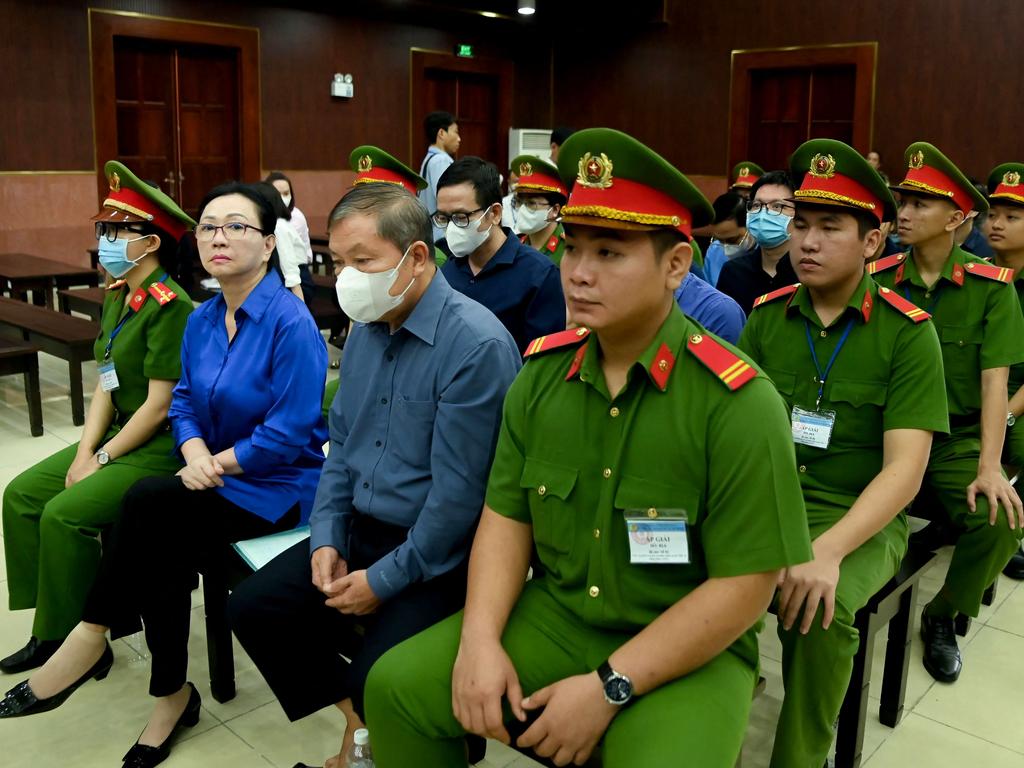Vietnamese property tycoon Truong My Lan must come up with $14 billion to avoid death penalty
A property tycoon who masterminded the world’s biggest bank fraud is in a race for her life to come up with an eyewatering sum of money.
HANOI: A Vietnamese property tycoon is in a race for her life to come up with $US9 billion (A$14 billion) to escape the death penalty for masterminding the world’s biggest bank fraud.
Truong My Lan, 68, was convicted earlier this year of swindling money from Saigon Commercial Bank (SCB) — the country’s fifth biggest lender — and sentenced to death for embezzling $US12.5 billion ($19.4 billion).
A Vietnamese court this week upheld the death penalty, but said her life could be spared if she paid back 75 per cent of the assets she embezzled — or more than $US9 billion — and the sentence instead commuted to life imprisonment.
During her first trial in April, Lan was found guilty of embezzling $US12.5 billion, but prosecutors said the total damages caused by the scam amounted to $US27 billion ($42 billion) — equivalent to around 6 per cent of the country’s 2023 GDP.
She appealed the verdict in a month-long trial, but on Tuesday the court in Ho Chi Minh City determined that there was “no basis” to reduce her sentence.
Her husband Eric Chu Nap Kee, a Hong Kong billionaire, had his sentence reduced from nine years in prison to seven.
Tens of thousands of people who invested their savings in SCB lost money, shocking the communist nation and prompting rare protests from the victims.

Race against time
Lan, who founded real estate development group Van Thinh Phat, earlier told the court that “the quickest way” to repay the stolen funds would be “to liquidate SCB, and sell our assets to repay SBV (State Bank of Vietnam) and the people”.
“I feel pained due to the waste of national resources,” Lan said last week, adding she felt “very embarrassed to be charged with this crime”.
Her defence team had argued that she already paid back the money needed to be eligible for a sentence reduction.
Lan has turned over more than 600 family properties to the court, it acknowledged — but it was unclear how much money they were worth.
Her lawyers have argued that while she is under sentence for death, it would be hard for her to negotiate the best price selling her assets.
“The total value of her holdings actually exceeds the required compensation amount,” lawyer Nguyen Huy Thiep told the BBC.
“However, these require time and effort to sell, as many of the assets are real estate and take time to liquidate. Truong My Lan hopes the court can create the most favourable conditions for her to continue making compensation.”
They also noted that in any case, it would likely be years before Lan faces execution, which is carried out by lethal injection in Vietnam.

Harbour, luxury homes
Lan owned just 5 per cent of shares in SCB on paper, but at her trial, the court concluded that she effectively controlled more than 90 per cent through family, friends and staff.
In April, a former chief inspector of the State Bank was given life in prison for accepting a $US5 million bribe to overlook financial problems at SCB. The court upheld the sentence on Tuesday.
The bank said in April that it pumped funds into SCB to stabilise it, without revealing how much. According to Reuters, documents suggest Vietnam’s central bank injected $US24 billion ($37 billion) in “special loans” into SCB.
Among the assets that Lan and Van Thinh Phat own are a shopping mall, a harbour and luxurious housing complexes in business hub Ho Chi Minh City.
Lan and dozens of defendants, including senior central bank officials, were arrested as part of a national corruption crackdown dubbed the “burning furnace” that has swept up numerous officials and members of Vietnam’s business elite.
Aside from Lan, a total of 47 other defendants requested reduced sentences at the appeal.
Last month, Lan was convicted of money laundering and jailed for life in a separate case.

‘Similar issues are rampant’
The multibillion-dollar fraud has exposed systemic weaknesses in the country’s banking sector, say analysts who warn other such cases could yet emerge.
Corruption is extensive in Vietnam, which ranked 83rd out of 180 in Transparency International’s most recent Corruption Perception Index.
But the monumental scale of Lan’s crime was unprecedented.
Banking experts fear other damaging allegations are lurking in hidden recesses of the financial sector of the fast-growing economy, which is seen as a favoured destination for foreign investors looking for an alternative to China.
“SCB is not a single problem, it is an illness of the whole economy,” banking expert Bui Kien Thanh told AFP.
The Vietnamese financial system was “characterised by a lack of tight state management”, he said.
“Similar issues are rampant in society, so [Vietnam] needs to study and fix the problem before others arise.”
Experts say a key systemic weakness is in the regulation of the corporate bond market, where companies borrow money from investors.

Contemplating suicide
In most developed markets, bonds are issued through independently regulated brokers on the basis of a full prospectus, graded by ratings agencies, and traded on stock exchanges.
But SCB, through its branches, misleadingly sold its bonds directly to retail customers, with staff trained for weeks on how to falsely reassure them their money was secure and the investment carried little risk.
Tens of thousands of people invested their savings in the bonds and lost everything when the bank collapsed and had to be bailed out by authorities, some of them contemplating suicide.
Most Vietnamese company debt is not rated for creditworthiness at all, with local ratings agency FiinRatings saying there were no corporate bonds with credit ratings in the country in the years before Lan’s arrest.
That compared with an average of around 50 per cent across the 10-member Association of South East Asian Nations (ASEAN).
According to state media, a judge at Lan’s original trial asked police to look into the role played by staff at three of the world’s biggest accounting firms that audited SCB’s books — Ernst & Young, Deloitte and KPMG.
None of the three responded to requests for comment by AFP.
At every level of the Vietnamese financial sector — from employees on the ground to regulatory authorities — there is a lack of training on financial markets, the risks involved and regulatory obligations, Mr Thanh said.

‘Can of worms’
The trial court found Lan used her position to direct SCB management staff to withdraw money from the bank, over time transporting the equivalent of $US4.4 billion ($6.8 billion) in cash in trucks to her home and the offices of her Van Thinh Phat property firm.
“They don’t question the paperwork … they just say, how are we going to do it? How fast can we do it?” said Khuong Huu Loc, an economist based in the United States.
“The whole system is a game based on collusion,” he added. “The problem is, it gets so bad, [but] people let her continue on because you don’t want to open the can of worms.”
Since the scandal emerged, Vietnam has stepped up an anti-corruption drive.
But Carl Thayer, an emeritus professor at the University of New South Wales, warned foreign investors were concerned anti-graft efforts had “led to a chilling effect on the state bureaucracy and a slowing of procedures”, with officials fearing taking any decision could lead to their motives being questioned.
Even so, he said the revelations from the case meant Vietnam “will have to take exceptional steps to audit the banking system effectively”.
Even if there was nothing on the gargantuan scale of SCB waiting to be found, Mr Loc said that “there could be a smaller version out there”.
“The question is how many?”





